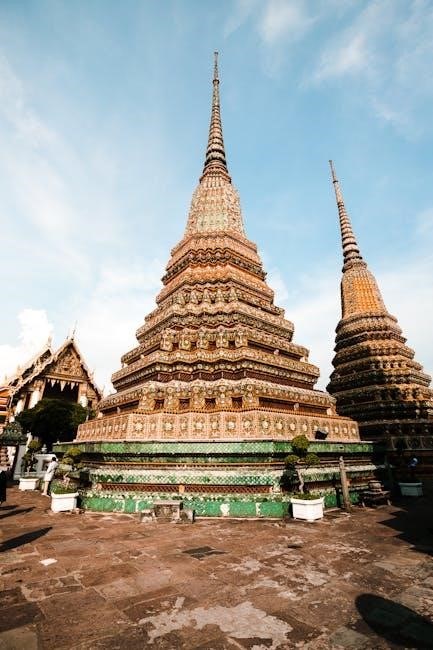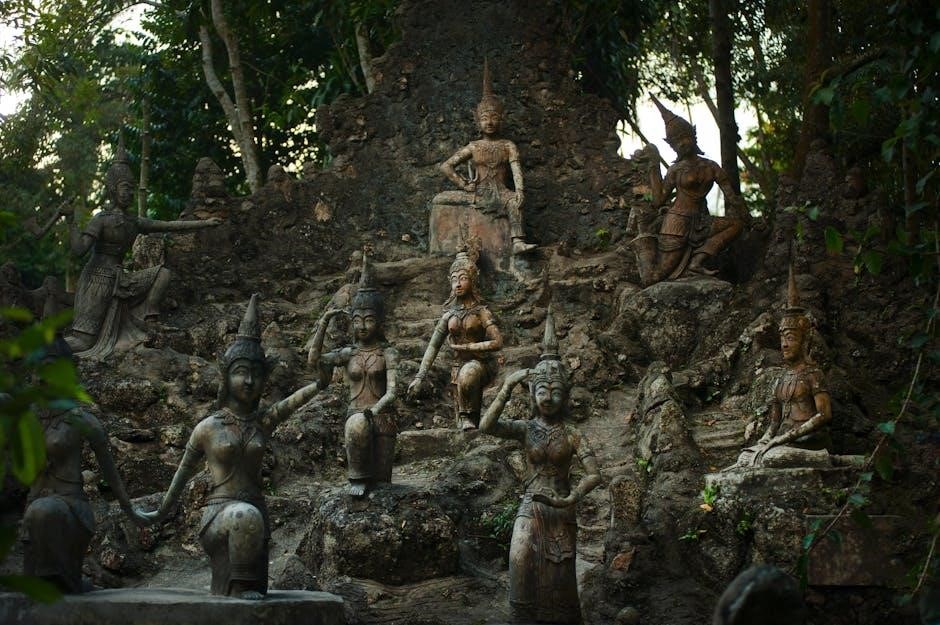Thai sexual culture blends tradition and modernity, with Buddhism influencing attitudes toward sexuality. Despite conservative norms, Thailand is known for its diverse gender roles and open tourism;
Overview of Thai Society and Sexuality
Thai society is deeply influenced by Buddhist teachings, which shape attitudes toward sexuality. Public discussion of sex remains modest, yet Thailand is renowned for its vibrant sex industry. Gender roles are distinct, with men often expressing sexuality openly while women are expected to maintain reserve. Nonbinary identities, such as kathoey (third gender), are culturally recognized, reflecting a nuanced understanding of gender diversity. Despite traditional norms, modern influences and tourism have created a complex sexual landscape. This duality between conservatism and openness defines Thailand’s unique approach to sexuality, blending cultural heritage with contemporary practices. Young people increasingly embrace Westernized views, challenging long-held societal norms.
Cultural Taboos and Openness in Sexual Discussions
Sexual discussions in Thailand often carry cultural taboos, with openness varying by age, gender, and social context. Publicly, sex is rarely discussed, especially among women, due to modesty norms. However, Thailand’s thriving sex industry and tourism suggest a paradoxical acceptance of sexuality. Buddhist teachings emphasize restraint, reinforcing these taboos. Men are often allowed more sexual freedom, while women are expected to maintain decorum. Younger generations, influenced by global trends, are more open to sexual discussions. Despite this, societal hierarchies and respect for elders limit frank conversations. Traditional sex education focuses on abstinence, but modern influences are slowly shifting attitudes, particularly among urban youth, who increasingly seek comprehensive sexual knowledge through informal channels like social media. This blending of tradition and modernity defines Thailand’s evolving sexual discourse.

Cultural Influences on Thai Sexuality
Buddhist teachings emphasize moderation and modesty, shaping Thai sexual attitudes. Traditional gender roles and societal expectations also influence sexual behavior, balancing reserved norms with modernizing influences.
Buddhist Teachings and Sexual Behavior
Buddhist teachings significantly influence Thai sexual behavior, emphasizing moderation and self-control. Sexuality is viewed as a natural part of life but should be approached with mindfulness and moral responsibility. The concept of karm (karma) plays a crucial role, as excessive or immoral sexual behavior is believed to lead to negative consequences in the next life. While Buddhism does not explicitly condemn homosexuality, traditional interpretations often associate non-conforming sexual orientations with karmic punishment. However, modern Thai society shows growing acceptance, blending religious principles with contemporary attitudes. These teachings shape gender roles and sexual norms, encouraging modesty and restraint while allowing for diverse expressions of sexuality in a rapidly changing cultural landscape.
Gender Roles and Expectations in Thai Society
Thai society is deeply patriarchal, with distinct gender roles shaping sexual behavior and expectations. Men are often encouraged to embrace dominance and assertiveness, while women are expected to remain reserved and submissive. Traditional norms emphasize female modesty, discouraging open discussion or participation in sexual matters. However, Thailand also recognizes nonbinary identities, such as kathoey (a third gender), demonstrating a cultural acceptance of gender fluidity. Despite these progressive elements, societal pressure often enforces conformity to traditional roles, particularly in public and familial contexts. Modernization has led to shifting attitudes, especially among younger generations, but gender expectations remain a significant influence on sexual culture and relationships in Thailand.

Sexual Education in Thailand
Sexual education in Thailand traditionally emphasizes modesty and restraint, influenced by Buddhist values. Modern approaches now promote comprehensive education, focusing on sexual health and rights, supported by growing LGBTQ+ inclusivity and online resources for youth.
Traditional vs. Modern Approaches to Sex Education
In Thailand, traditional sex education often emphasizes modesty and restraint, reflecting Buddhist values that discourage open discussions about sexuality. This approach focuses on abstinence and avoiding explicit content, particularly for women, who are expected to maintain reserve. However, modern approaches are emerging, influenced by global trends and the need for comprehensive sexual health education. Organizations and educators are increasingly advocating for inclusive, rights-based programs that address sexual health, consent, and LGBTQ+ issues. While traditional methods remain prevalent in rural areas, urban centers and younger generations are embracing more progressive, open-minded perspectives, blending cultural values with modern understanding.
Impact of Social Media on Young People’s Sexual Knowledge

Social media has become a significant source of sexual knowledge for Thai youth, offering both information and misinformation. Platforms like YouTube and Instagram provide accessible content, blending traditional values with global perspectives. While this exposure broadens understanding, it also introduces conflicting views, as Thai culture traditionally avoids open sexual discussions. Young people are increasingly influenced by Western ideals, leading to a shift in attitudes toward sexuality. However, the lack of regulated content raises concerns about the accuracy of information, potentially leading to misunderstandings. Despite these challenges, social media has opened doors for dialogue, enabling youth to explore topics once deemed taboo, though it underscores the need for comprehensive sexual education to guide them effectively.

Gender Identity and Sexual Orientation
Thai culture recognizes diverse gender identities, including nonbinary and third genders, though societal acceptance varies. LGBTQ+ visibility exists, yet traditional norms often influence expectations and acceptance levels.
Recognition of Nonbinary and Third Gender Identities
In Thai culture, nonbinary and third gender identities, such as kathoey (often referred to as “ladyboys”), are culturally recognized but not fully legally acknowledged. While these identities are visible in society, particularly in urban areas, legal recognition remains limited. Thailand’s gender diversity is reflected in its folklore and historical texts, which include references to gender fluidity. Despite this cultural acknowledgment, societal acceptance varies, with greater tolerance in urban centers compared to rural regions. Buddhist teachings, which do not explicitly condemn nonbinary identities, contribute to a relatively tolerant environment. However, legal and social challenges persist, highlighting the gap between cultural recognition and formal acceptance of nonbinary and third gender identities in Thailand.
LGBTQ+ Rights and Acceptance in Thailand
Thailand is often perceived as a tolerant and LGBTQ+-friendly country, with Bangkok serving as a hub for queer culture. Despite this, legal recognition of LGBTQ+ rights remains limited, as same-sex marriage and adoption rights are not fully established. Thai society is largely accepting of LGBTQ+ individuals, particularly in urban areas, where diversity is more visible. However, rural regions often exhibit more conservative attitudes. Buddhism’s neutral stance on homosexuality contributes to this relative tolerance. The visibility of kathoey (third gender individuals) in Thai culture reflects a historical acceptance of gender diversity. While Thailand markets itself as an LGBTQ+ tourist destination, societal acceptance varies, and legal protections for LGBTQ+ individuals are still evolving.

Legal and Social Acceptance of Sexuality
Thailand’s laws and society show tolerance toward diverse sexualities, though LGBTQ+ rights lack legal recognition. Prostitution is prevalent but socially complex, reflecting a mix of acceptance and stigma.
Legal Status of Same-Sex Relationships and Marriage
Same-sex relationships are legal in Thailand, decriminalized since 1956, but marriage equality remains unachieved. In 2020, Thailand introduced civil partnerships, granting some rights like inheritance and medical decision-making. However, full marriage equality is still pending. LGBTQ+ rights have gained visibility, but legal recognition for same-sex unions is limited. Efforts to legalize same-sex marriage continue, reflecting societal progress and ongoing advocacy. Despite these advancements, same-sex couples lack equal legal protections compared to heterosexual counterparts, highlighting the need for further reform to achieve true equality in Thailand.
Prostitution and Sex Work in Thai Culture
Prostitution in Thailand is complex, with a thriving sex industry despite its illegal status. Sex work is widespread, particularly in tourist areas, and often operates under the radar of law enforcement. Cultural attitudes toward prostitution vary, with some viewing it as a necessary economic option, especially for women in rural areas. The industry is fueled by both domestic and international demand, with sex workers facing challenges like stigma and limited legal protections. Efforts to regulate or legalize prostitution continue to spark debate, highlighting the tension between economic realities and societal norms in Thailand.
Thai sexual culture reflects a journey from traditional norms to modern openness, shaped by societal shifts and evolving attitudes toward gender, sexuality, and freedom of expression.
Evolution of Sexual Culture in Thailand
Thai sexual culture has undergone significant transformation, blending traditional Buddhist values with modern influences. Historically, sexuality was deeply tied to societal norms, emphasizing modesty and gender roles. However, globalization and digital connectivity have reshaped attitudes, particularly among younger generations. Social media and online platforms have emerged as key sources of sexual education, challenging conventional taboos. While prostitution and sex work remain prevalent, they coexist with growing acceptance of LGBTQ+ identities. Despite these changes, cultural norms still influence sexual behavior, reflecting a complex interplay between tradition and progress. This evolution highlights Thailand’s dynamic journey toward a more open and diverse sexual culture.

Future Prospects for Sexual Freedom and Education
Thailand’s sexual culture is poised for gradual liberation, driven by shifting societal norms and educational reforms. Younger generations, exposed to global influences, are advocating for comprehensive sexual education. Digital platforms are bridging gaps in knowledge, fostering open discussions about gender and sexuality. Efforts to integrate LGBTQ+ rights into legal frameworks signal progress, though societal acceptance remains uneven. Education systems are beginning to address sexual health more openly, challenging traditional taboos. While cultural and religious influences persist, Thailand’s trajectory suggests a future where sexual freedom and education are more accessible and inclusive, reflecting a modernizing society navigating tradition and change.